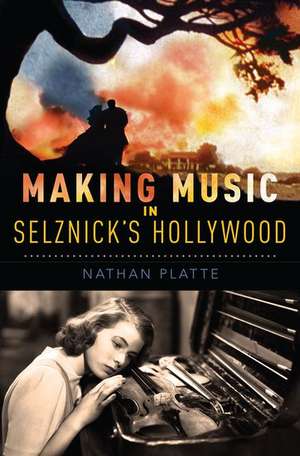Making Music in Selznick's Hollywood: Oxford Music/Media Series
Autor Nathan Platteen Limba Engleză Hardback – 30 noi 2017
Din seria Oxford Music/Media Series
- 13%
 Preț: 198.15 lei
Preț: 198.15 lei - 13%
 Preț: 251.18 lei
Preț: 251.18 lei - 13%
 Preț: 251.65 lei
Preț: 251.65 lei -
 Preț: 249.75 lei
Preț: 249.75 lei - 8%
 Preț: 305.90 lei
Preț: 305.90 lei - 12%
 Preț: 230.49 lei
Preț: 230.49 lei -
 Preț: 288.05 lei
Preț: 288.05 lei - 8%
 Preț: 299.68 lei
Preț: 299.68 lei - 10%
 Preț: 275.52 lei
Preț: 275.52 lei - 20%
 Preț: 276.00 lei
Preț: 276.00 lei -
 Preț: 255.61 lei
Preț: 255.61 lei - 8%
 Preț: 215.19 lei
Preț: 215.19 lei - 12%
 Preț: 238.61 lei
Preț: 238.61 lei - 5%
 Preț: 262.90 lei
Preț: 262.90 lei - 20%
 Preț: 241.08 lei
Preț: 241.08 lei - 23%
 Preț: 182.29 lei
Preț: 182.29 lei - 17%
 Preț: 323.28 lei
Preț: 323.28 lei - 5%
 Preț: 266.75 lei
Preț: 266.75 lei - 19%
 Preț: 465.70 lei
Preț: 465.70 lei - 22%
 Preț: 182.65 lei
Preț: 182.65 lei - 12%
 Preț: 235.78 lei
Preț: 235.78 lei - 15%
 Preț: 247.40 lei
Preț: 247.40 lei - 5%
 Preț: 292.08 lei
Preț: 292.08 lei
Preț: 325.85 lei
Preț vechi: 444.81 lei
-27% Nou
Puncte Express: 489
Preț estimativ în valută:
62.36€ • 64.73$ • 51.100£
62.36€ • 64.73$ • 51.100£
Carte disponibilă
Livrare economică 21-27 februarie
Preluare comenzi: 021 569.72.76
Specificații
ISBN-13: 9780199371112
ISBN-10: 0199371113
Pagini: 416
Ilustrații: 29 line art; 27 halftones
Dimensiuni: 155 x 239 x 33 mm
Greutate: 0.68 kg
Editura: Oxford University Press
Colecția OUP USA
Seria Oxford Music/Media Series
Locul publicării:New York, United States
ISBN-10: 0199371113
Pagini: 416
Ilustrații: 29 line art; 27 halftones
Dimensiuni: 155 x 239 x 33 mm
Greutate: 0.68 kg
Editura: Oxford University Press
Colecția OUP USA
Seria Oxford Music/Media Series
Locul publicării:New York, United States
Recenzii
In this meticulous study, which entailed archival research, Platte (music history, Univ. of Iowa) introduces readers to the overlooked others who were responsible for creating Selznick's scores, for example, music editor Audray Granville, who worked on Spellbound. Emphasis is on films that were produced by Selznick himself; therefore, for example, I'll Be Seeing You (1944)produced by Selznick International, is not included. The first in-depth, book-length study to explore Selznick's own role in film scoring, this volume offers early history on Selznick's musical experiments while at Paramount in the 1920s, music examples, transcriptions of Selznick's memos to rewrite music, film stills, premiere programs, and pictures of family members and those who, like Granville, worked behind the scenes.
Platte has provided an attractively-written and compelling book that offers not only an endlessly fascinating musical portrait of Selznick himself but also a window on the practices of studio-era music-making. It will, I am sure, be a staple of bibliographies of film-music history for many years to come.
Engagingly written and with a companion website that offers exemplary film clips, Making Music in Selznick's Hollywood expands the scholarly literature on film musicology, which has tended to focus primarily on composers, to consider the important contributions of others in the studio music department. As such, Platte challenges our understanding of how music was conceived for films and encourages us toward a deeper understanding of the scoring process, making this book a significant addition to any film music collection.
Platte has provided an attractively-written and compelling book that offers not only an endlessly fascinating musical portrait of Selznick himself but also a window on the practices of studio-era music-making. It will, I am sure, be a staple of bibliographies of film-music history for many years to come.
Engagingly written and with a companion website that offers exemplary film clips, Making Music in Selznick's Hollywood expands the scholarly literature on film musicology, which has tended to focus primarily on composers, to consider the important contributions of others in the studio music department. As such, Platte challenges our understanding of how music was conceived for films and encourages us toward a deeper understanding of the scoring process, making this book a significant addition to any film music collection.
Notă biografică
Nathan Platte teaches music history at the University of Iowa. He is co-author of Franz Waxman's Rebecca: A Film Score Guide (Scarecrow Press, 2012) and co-editor of The Routledge Film Music Sourcebook (Routledge, 2011).
